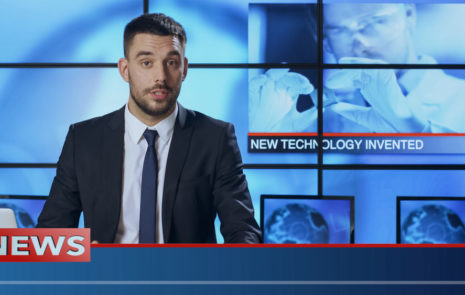
News media interviews: What to say when you can’t say
Do you ever get frustrated when you’re reading or watching a news media interview and the interviewee doesn’t answer a question? He or she either talks about something that has nothing to do with the question or simply says, “No comment.”
These two ways of “answering” questions turn off the audience and prevent the interviewee from getting his or her story heard.
To be fair, there are some questions interviewees really can’t answer in a news media interview – for example, when the information is confidential or competitive.
But instead of saying, “I can’t tell you,” there is another, better way to acknowledge the question without turning off the audience or making them skeptical. A way to retain the audience’s attention and get your message through in a news media interview.

The power of why in news media interviews
When you tell the audience why you can’t answer a question by giving a reason, you are more likely to hold their attention, preserve your credibility and get your story heard.
When you want people to take action, and get an audience to act on your message, use the magic word because.
Here’s why. As reported in Psychology Today, Dr. Ellen Langer of Harvard conducted a study using the word because.

Dr. Langer had people cut into a very long line at a copying machine at finals time. She had each person use a different phrase when they asked to cut into the queue:
- “Excuse me, I have 5 pages. May I use the Xerox [copy] machine?”
- “Excuse me, I have 5 pages. May I use the Xerox machine, because I have to make copies?”
- “Excuse me, I have 5 pages. May I use the Xerox machine, because I’m in a rush?”
This study was conducted several years ago when copy machines were still quite popular. Ready for the results?
For the first line-jumper, who did not offer any reason why, 60% of people complied with the request.
But the next person gave a reason using the word because. Even though it was the same reason everyone else was in line, compliance jumped to 93%!
That’s only one percent lower than the last queue, where the person said he or she was in a rush. In this case, 94% of people in line complied.
The results are clear: when you give them a reason why, people are much more likely to hear your message and comply.
Use the word because in news media interviews
Now you may be thinking, that’s great, but how do I use this insight when the news media interviews me or one of my spokespeople?
Here’s an example: let’s say you are asked about the date or details for an upcoming product launch.
You could say, “I can’t give you that information.” Or, you could give a reason. You could say, “I can’t give you that information because it’s confidential.”
Notice the difference in those two statements? Giving a reason, the why behind why you can’t answer, communicates that while you’d like to answer, there is a real reason why you can’t.
I often advise my clients to take this answer one step further and say, “I know your listeners/readers would love to know that, but so would my competitors. So I can’t answer that right now because it’s confidential. However, as soon as we’re ready to make things public, I’ll let you know.”
In addition to giving a reason, this second option also offers to let the person know in the future, which makes you appear more helpful and relatable. In giving that answer, you do the right thing by your organization and your target audience.

Another approach when you can’t answer a direct question is to share what information you can. Let’s say a reporter asks you to name a few of your largest clients.
You could say: “Unfortunately, because those clients have not yet given us permission to name them, I can’t disclose their names. What I can tell you is that we serve half of the Fortune 500 with our solutions.”
While you haven’t violated any confidentiality clauses with your clients, you’ve at least given the reporter some idea of who you clients are. Again, it makes you helpful and relatable. And it holds audience attention so you get your story heard.
What if you’re in a crisis?
The news media have the power to publish great things about your company, bad things about your company, or not publish at all. Developing good relationships and gaining a reputation as a helpful spokesperson will help you and your organization in the long run, especially in times of crisis.
As Dominic Cilea says in his blog, “Be available and accessible to the media … Accessibility equals transparency, which will enable you to build relationships and trust.”
Handling a company crisis is tough, because today’s media operate in real time, so every minute matters. And sometimes you don’t yet know the why in the beginning of a crisis.
It’s okay to say, “We don’t know that answer right now, but as soon as we know more, we will let you know.” Of course, when you say this, you do need to follow up with the reporter as soon as you do have this information.
Remember, once you do have the answers, always give a reason why you can’t tell the reporter particular details.
When done well, media interviews can help you and your company get your story heard. And when you’re armed with that important word because, you need not worry when you can’t answer a reporter’s questions.
For more tips on how to deliver on-message communications, subscribe to our blog.
Related Posts
Do we marketers create too much work for buyers?
Let’s simplify marketing. And begin at the beginning. In Genesis 3, God said: By the sweat of your face shall you get bread to eat,...
Want your story in the news media? Read these tips.
“Why weren’t we quoted in that story?” “Why didn’t get any coverage on our new product launch?” Sound familiar? I’ve worked with many organizations...
“How do you keep content relevant?”
A marketer recently asked: “How do you keep content relevant? People get on to the next thing so fast and have lots of info...
What do marketers want to know about content marketing? [Infographic]
“What are your top 3 content marketing questions?” That’s a question I asked hundreds of marketers in my workshops over the past year. An analysis of...





